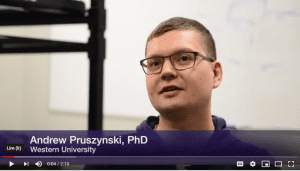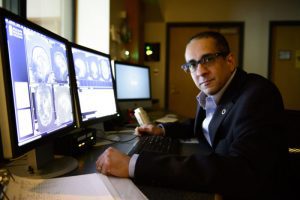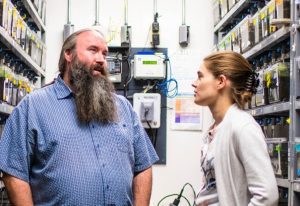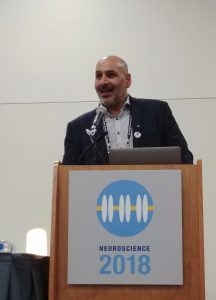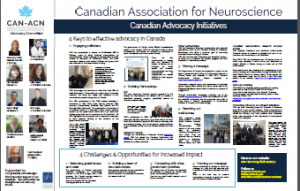A major aspect of brain health relates to the negative functional, psychological, and social consequences of brain lesions and dysfunctions. Conversely, behavioural, cognitive, psychological and social interventions can improve outcomes following brain insults. Using a variety of strategies, including animal models, cellular and molecular biology, genomics, electrophysiology, behaviour and neuroimaging, this chair will examine the interactions among the biological bases of functional neural plasticity, cognitive functioning, and brain health. The development of innovative strategies and therapeutic tools is dependent on understanding of the physical and psychological manifestations of brain diseases.
Assigned to the School of Psychology in the Faculty of Social Sciences, the chair will strengthen efforts that have been made to make uOttawa an international leader in Brain Health and will also benefit from collaborations with colleagues in the Faculty of Medicine, in the uOttawa Brain and Mind Research Institute, the Ottawa Hospital Research Institute, and the Institute on Mental Health Research at the Royal Mental Health Centre.
Tier 2 CRC Program Description: Tier 2 Chairs, tenable for five years and renewable once, are for exceptional emerging researchers, acknowledged by their peers as having the potential to lead in their field. For each Tier 2 Chair, the institution receives $100,000 annually for five years. New Tier 2 Chairs will also receive an annual research stipend of $20,000 during their first term.
Candidates should, at a minimum, be assistant or associate professors, or possess the necessary qualifications to be appointed to these levels. Nominating institutions may nominate a professor or a researcher who is more than 10 years from their highest degree at the time of nomination and has experienced legitimate career interruptions (see acceptable justifications). In such cases, institutions must submit to the Secretariat a formal justification (using the Tier 2 Justification Screening Form), explaining why the nominee is still considered to be an emerging scholar. The University recognizes the legitimate impact that leaves (e.g., parental leave, leave due to illness) can have on a candidate’s record of research achievement and that these leaves will be taken into careful consideration during the assessment process. New CRC nominees are also eligible for infrastructure support from the Canada Foundation for Innovation (CFI) to help acquire state-of-the-art equipment essential to their work.
Preferential Hiring: The University of Ottawa strongly supports a workplace environment that removes disparities experienced by the designated groups in Canada: women, aboriginal peoples, persons with disabilities and members of visible minorities, as defined in the Employment Equity Act. This competition is a preferential hiring, which gives priority to one or more of the designated groups. Candidates from these groups who wish to qualify for preferential consideration must fill the self-identification form: https://research.uottawa.ca/sites/research.uottawa.ca/files/edi_questionnaire_ovpr_for_prizes_en_24-oct-2018-converted_fillable.pdf.
Required Qualifications: A PhD in Psychology, superior research achievements in the CRC’s identified area(s) and proof of interdisciplinary collaborations, a solid record with respect to teaching and training of students at the graduate level, the ability to obtain external research funds, excellent communication skills in either English or French. An active knowledge of the other official language would be an asset.
Rank and salary: Regular tenure-track academic appointment in the School of Psychology in the Faculty of Social Sciences. This position is governed by a collective agreement between the University of Ottawa and the Association of Professors of the University of Ottawa.
Application Package:
- A cover letter;
- An up-to-date curriculum vitae (please include career interruptions such as parental or sick leaves that may have impacted your record of research. These will be taken into consideration in the selection process);
- A research plan (2 to 3 pages);
- A statement of teaching interests (1 to 2 pages); and
- The names of three people who may be contacted by the University for letters of reference.
Deadline: February 25th 2019
The selection process will begin in February and will continue until the position is filled. Only candidates selected for an interview will be contacted. Please send the application package to the following address or by email to:
Dr. Sylvain Charbonneau, Vice-President, Research
University of Ottawa
550 Cumberland St., room 246
Ottawa, ON K1N 6N5 CANADA
rcca-coord@uOttawa.ca
If you are invited to continue the selection process, please notify us of any particular adaptive measures you might require by contacting the Office of the Associate Vice-President, Faculty Affairs at 613-562-5958. The Canada Research Chairs Program imposes no restrictions on nominees with regard to nationality or country of residence. Procedures to allow non-Canadian chairholders to work in Canada have been established by Employment and Social Development Canada and Immigration, Refugees and Citizenship Canada.
The University of Ottawa is justly proud of its 160-year tradition of bilingualism. Through its Official Languages and Bilingualism Institute, the University provides training to staff members and their spouses in their second official language. At the time of tenure, professors are expected to be able to function in a bilingual setting. In certain cases, professors must have the ability to teach in both official languages to be granted tenure.
Posted online: 11/01/2019
Download this advertisement as a PDF document:
CRC Advertisement-NeuroCognitiveFunctioning-Final_EN
